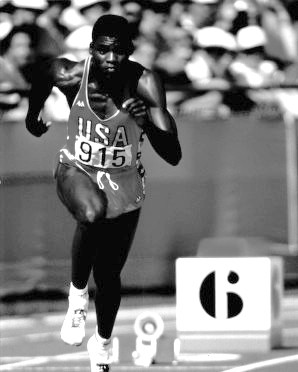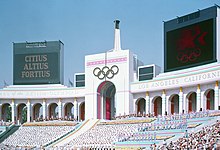
The Solomon Islands sent a delegation to compete at the 2004 Summer Olympics in Athens, Greece, from 13 to 29 August 2004. This was the nation's sixth appearance at a Summer Olympic Games since their debut in the 1984 Summer Olympics. The Solomon Islands sent two athletes to these games, both in track and field: Francis Manioru and Jenny Keni. Manioru competed in the men's 100 meters and Keni in the women's event of the same distance. Neither advanced out of their event's heats.

Equatorial Guinea competed at the 2004 Summer Olympics in Athens, which was held from 13 to 29 August 2004. The country's participation at Athens marked its sixth appearance in the Summer Olympics since its début at the 1984 Summer Olympics. The delegation included two athletics competitors: Roberto Mandje and Emilia Mikue Ondo in the long and middle distance disciplines respectively. Mikue Ondo was selected as the flag bearer for the opening ceremony. Both athletes did not advance further than the first round of their respective events with Mandje failing to make the start of the men's 3000 metres steeplechase.
Innocent Ejima Egbunike is a former sprinter from Nigeria.

Equatorial Guinea participated in the 2000 Summer Olympics in Sydney, Australia, which was held from 15 September to 1 October 2000. The country's participation in Sydney marked its fifth appearance in the Summer Olympics since its debut at the 1984 Summer Olympics. The delegation included one middle-distance runner, one short-distance sprinter and two swimmers: José Luis Ebatela Nvo, Mari Paz Mosanga Motanga, Eric Moussambani and Paula Barila Bolopa respectively. All four athletes qualified for the games through wildcard places. Moussambani was selected as the flag bearer for the opening ceremony. The four athletes were unable to advance beyond the first rounds of their respective events, with Moussambani and Bolopa attracting attention for their poor performances, but were applauded by the crowds.

Nigeria competed at the 1984 Summer Olympics in Los Angeles, United States.

The British Virgin Islands sent a delegation to compete at the 2000 Summer Olympics in Sydney, Australia from 15 September to 1 October 2000. This was the territory's fifth appearance at a Summer Olympic Games. The delegation consisted of a single track and field athlete, Keita Cline. He was eliminated during the first round of the men's 200 meters.

Djibouti took part in the 2000 Summer Olympics, which were held in Sydney, Australia from 15 September to 1 October. The country's participation at Sydney marked its fifth appearance in the Summer Olympics since its debut at the 1984 Summer Games in Los Angeles, United States. The delegation included two track and field athletes; Omar Daher Gadid in the men's marathon and Roda Ali Wais in the women's 800 metres. Gadid failed to finish the marathon, while Wais did not progress past the first round of her event.

Bangladesh sent a delegation to compete in the Olympic Games for the first time at the 1984 Summer Olympics in Los Angeles, United States from 28 July to 12 August 1984. The Bangladeshi delegation consisted of a single track and field athlete, Saidur Rahman Dawn. In his two events, the 100 metres and 200 metres, he did not qualify to advance beyond the first round.

São Tomé and Príncipe sent a delegation to compete in the Olympic Games for the first time at the 1996 Summer Olympics in Atlanta, United States from 19 July to 4 August 1996. The delegation consisted of two 100 meters sprinters, Sortelina Pires and Odair Baia. Neither of them were able to advance from their heats.
Gustavo Bodjedi Envela Mahua, known as Gus Envela Jr., is an Equatorial Guinean actor, politician and former sprinter, currently based in Washington, D.C., United States.

The men's 1500 metres was an event at the 1984 Summer Olympics in Los Angeles, California. The final was held on August 11, 1984. Fifty-nine athletes from 40 nations competed. The maximum number of athletes per nation had been set at 3 since the 1930 Olympic Congress. The event was won by 0.87 seconds by Sebastian Coe of Great Britain, the first man to successfully defend an Olympic 1500 metres title. Steve Cram's silver made it the first time a nation had gone 1–2 in the event since Great Britain had done it in 1920. José Manuel Abascal's bronze was Spain's first medal in the event.

The men's 200 metres at the 1984 Summer Olympics in Los Angeles, United States had an entry list of 76 competitors from 58 nations, with ten qualifying heats (76), four quarterfinals (32), and two semifinals (16) before the final (8) took off on Wednesday August 8, 1984. The maximum number of athletes per nation had been set at 3 since the 1930 Olympic Congress. The event was won by 0.16 seconds by Carl Lewis of the United States, the nation's first victory in the men's 200 metres since 1968 and 13th overall. It was the third gold medal of the Games for Lewis, who was attempting to match Jesse Owens in winning the 100, 200, long jump, and 4x100 relay; his victory in this event left only the relay to go, in which the United States was heavily favored. The American team competed in a medal sweep in this event, the first since 1956 and the fifth overall for the United States, with Kirk Baptiste earning silver and Thomas Jefferson taking bronze.

Equatorial Guinea competed at the 2008 Summer Olympics in Beijing, which was held from 8 to 24 August 2008. The country's participation at Beijing marked its seventh appearance in the Summer Olympics since its début at the 1984 Summer Olympics. The delegation included the sprinter Reginaldo Ndong, middle-distance runner Emilia Mikue Ondo and half-middleweight judoka José Mba Nchama. Ndong and Mikue Ondo qualified for the Games through wildcard places and Mba Nchama entered through his ranking at the 2007 African Judo Championships. Mikue Ondo was chosen as the flag bearer for both the opening and closing ceremonies. Ndong and Mikue Ondo progressed no farther than the first round of their respective events and Mba Nchama was eliminated from contention in the second round of the contest.

The men's 400 metres was an event at the 1984 Summer Olympics in Los Angeles, California. It was held from August 4 to August 8. Eighty athletes from 56 nations competed. The maximum number of athletes per nation had been set at 3 since the 1930 Olympic Congress. The event was won by 0.27 seconds by Alonzo Babers, returning the United States to the top of the podium for the first time since 1972. Gabriel Tiacoh won the Ivory Coast's first Olympic medal in any event, with a silver.
The men's 400 metres was an event at the 1980 Summer Olympics in Moscow. The competition was held from July 27 to July 30, 1980. Fifty athletes from 32 nations competed. The maximum number of athletes per nation had been set at 3 since the 1930 Olympic Congress. The event was won by 0.24 seconds by Viktor Markin of the Soviet Union, the nation's first title in the men's 400 metres and first medal in the event since 1956. With the United States boycotting the Games, the country was not represented on the podium for the first time since 1920. Australia earned its first medal in the event with Rick Mitchell's silver, while East Germany won its first medal with Frank Schaffer's bronze, which was the first medal by any German since the United Team took silvers in 1956 and 1960.
The men's 100 metres sprint event at the 1984 Olympic Games took place between August 3 and August 4. Eighty-two athletes from 59 countries participated. Each nation was limited to 3 athletes per rules in force since the 1930 Olympic Congress. The event was won by Carl Lewis of the United States, that nation's first title after two Games of missing the podium. Canada's Ben Johnson took bronze to break up the Americans' bid to sweep the podium ; it was Canada's first medal in the event since 1964.

Equatorial Guinea competed at the 2012 Summer Olympics in London, which was held from 27 July to 12 August 2012. The country's participation at London marked its eighth appearance in the Summer Olympics since its début at the 1984 Summer Olympics. The delegation included two track and field athletes, Benjamín Enzema and Bibiana Olama who both qualified for the Games via wildcard places because their fastest times did not meet the required qualification standards. Olama was selected as the flag bearer for both the opening and closing ceremonies. Both athletes did not advance beyond the first round of their respective events.

Equatorial Guinea competed at the 2016 Summer Olympics in Rio de Janeiro, Brazil, which was held from 5 to 21 August 2016. The country's participation at Rio marked its ninth appearance in the Summer Olympics since its début in the 1984 Summer Olympics. The delegation included two track and field athletes, Benjamin Enzema and Reïna-Flor Okori who both qualified for the Games through wildcard places since their fastest times did not meet the required qualification standards, Okori was selected as the flag bearer for the opening and closing ceremonies. Enzema did not advance beyond the qualification round for the men's 800 metres event and Okori was unable to start the women's 100 metre hurdles contest.
Diosdado Lozano Idjabe is an Equatorial Guinean Olympic middle-distance runner. He represented his country in the men's 1500 meters at the 1984 Summer Olympics. His time was a 4:34.71 in the first heat.
Bartolomé Esono Asumu is an Equatoguinean middle-distance runner. He competed in the men's 800 metres at the 1984 Summer Olympics.











